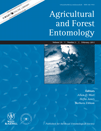
AGRICULTURAL AND FOREST ENTOMOLOGY
Scope & Guideline
Innovating pest management for a greener future.
Introduction
Aims and Scopes
- Pest Management Strategies:
Research dedicated to the development and evaluation of effective pest management strategies, including biological control, chemical treatments, and integrated pest management approaches. - Ecological Interactions:
Studies focusing on the interactions between insects and their environment, including predator-prey dynamics, competition, and the effects of habitat structure on insect communities. - Insect Behavior and Physiology:
Investigations into the behavior and physiological responses of insects to environmental factors, including stressors such as climate change and habitat modifications. - Biodiversity and Conservation:
Research aimed at understanding insect biodiversity and the implications for conservation, particularly in agricultural landscapes and forest ecosystems. - Impact of Climate Change:
Exploration of how climate change affects insect populations, distribution, and interactions within both agricultural and forest contexts.
Trending and Emerging
- Sustainable Agriculture Practices:
There is an increasing trend towards research that integrates ecological principles into agricultural practices, emphasizing biodiversity and ecosystem services to enhance pest management. - Use of Technology in Insect Monitoring:
Emerging themes include the application of advanced technologies such as AI and molecular techniques for pest monitoring and management, reflecting a shift towards data-driven approaches. - Pollinator Health and Management:
A growing number of studies focus on the health of pollinators and their role in agroecosystems, driven by concerns over pollinator decline and its implications for food production. - Climate Change Effects on Insects:
Research exploring the impacts of climate change on insect populations, behavior, and distribution is gaining traction, highlighting the need for adaptive management strategies in both agriculture and forestry. - Community Ecology and Insect Interactions:
An increasing interest in community ecology emphasizes the interactions among various insect species and their roles within ecosystems, moving beyond single-species studies.
Declining or Waning
- Traditional Chemical Control Methods:
There seems to be a waning focus on conventional chemical pest control methods, as the emphasis shifts towards integrated and more sustainable approaches to pest management. - Invasive Species Studies:
While still relevant, the number of studies exclusively focusing on invasive species has decreased, possibly due to a growing interest in broader ecological interactions and management strategies. - Narrow Taxonomic Studies:
Research that is highly specific to a single taxonomic group without considering broader ecological or agricultural implications appears to be less prominent, signaling a trend towards more holistic approaches.
Similar Journals

REVISTA DE LA SOCIEDAD ENTOMOLOGICA ARGENTINA
Connecting Minds in Entomology and EcologyREVISTA DE LA SOCIEDAD ENTOMOLOGICA ARGENTINA is an esteemed open-access journal dedicated to the field of entomology, published by the SOCIEDAD ENTOMOLOGICA ARGENTINA. Since its transition to open access in 2013, the journal has sought to promote research in insect science, ecology, and related disciplines, facilitating global dissemination of knowledge and encouraging collaborative studies across borders. Located in the vibrant scientific landscape of La Plata, Argentina, the journal is indexed in Scopus and categorized in the fourth quartile of ecology and insect science, reflecting its commitment to enhancing the discourse within these critical fields. Aiming to bridge the gap between researchers, students, and professionals, REVISTA DE LA SOCIEDAD ENTOMOLOGICA ARGENTINA serves as a platform for innovative research, reviews, and reports on ecological interactions, behavior, and systematic entomology, ultimately driving forward our understanding of insect biodiversity and its broader environmental impacts.

Frontiers in Insect Science
Pioneering Research in Insect Ecology and BeyondFrontiers in Insect Science is a pioneering open-access journal dedicated to the advancement of knowledge in the field of insect science. Published by FRONTIERS MEDIA SA in Switzerland, this journal serves as a vital platform for researchers, professionals, and students to disseminate high-quality, peer-reviewed research spanning diverse topics within insect biology, ecology, and pest management. Since its establishment in 2021, the journal has gained recognition, ranking in the Q2 category of Insect Science with a Scopus ranking of #92 out of 181 in the field. With a commitment to promoting open access and collaboration, Frontiers in Insect Science is instrumental in fostering innovative research and practical applications essential for combating biodiversity loss and enhancing agricultural sustainability. As a freely accessible resource, it invites contributions that impact both fundamental and applied insect research, connecting a global network of scholars eager to explore the fascinating world of insects.
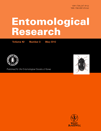
ENTOMOLOGICAL RESEARCH
Innovating Pest Management Strategies through ResearchENTOMOLOGICAL RESEARCH, published by Wiley, is a prominent journal within the field of Insect Science, with a significant focus on advancing our understanding of entomological studies, including pest management, biodiversity, and ecological impacts of insects. Since its inception in 2007, the journal has served as a vital platform for researchers and practitioners to publish high-quality, peer-reviewed articles that contribute to the growing body of knowledge in this essential discipline. With an H-index illustrating its citation impact and its classification in the 2023 Scopus quartile rankings at Q3, ENTOMOLOGICAL RESEARCH ranks 69 out of 181 journals in its field, positioning itself within the 62nd percentile, which underscores its relevance and contribution to agricultural and biological sciences. Although it does not offer Open Access, the journal remains committed to ensuring that its content reaches the widest possible audience, supporting ongoing discoveries and innovations in insect science. For researchers, professionals, and students seeking to remain at the forefront of entomological advancements, ENTOMOLOGICAL RESEARCH is an indispensable resource.
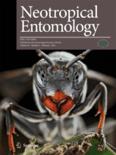
NEOTROPICAL ENTOMOLOGY
Illuminating the World of Insects in the NeotropicsNEOTROPICAL ENTOMOLOGY, published by the Entomological Society of Brazil, is a leading journal in the field of Insect Science, recognized for its significant contributions to the understanding of entomological research within the Neotropical region. With an impact factor placing it in the Q2 category and ranked #52 out of 181 in the Scopus rankings for Agricultural and Biological Sciences, this journal provides a vital platform for both seasoned researchers and emerging scholars to publish their innovative findings. Covering a broad scope of topics related to entomology, NEOTROPICAL ENTOMOLOGY aims to highlight the unique biodiversity and ecological significance of insects, fostering further appreciation and study within this crucial area of life sciences. The journal is available in both print (ISSN: 1519-566X) and online (E-ISSN: 1678-8052), ensuring accessibility to a wide audience and enhancing the dissemination of knowledge. As it converges towards its 2024 volume, the journal remains committed to advancing the scientific understanding of insect life in the tropics, making it an essential resource for researchers, professionals, and students alike.
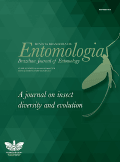
REVISTA BRASILEIRA DE ENTOMOLOGIA
Exploring the intricate world of entomology.REVISTA BRASILEIRA DE ENTOMOLOGIA, published by the SOCIEDADE BRASILEIRA DE ENTOMOLOGIA, is a premier open-access journal dedicated to the field of insect science, particularly within the context of Brazil's rich biodiversity. Since its inception in 2002, this journal has aimed to provide a platform for the dissemination of high-quality research, covering various aspects of entomology including behavior, ecology, and the impact of insects on agriculture. With an ISSN of 0085-5626 and an E-ISSN of 1806-9665, it is indexed in Scopus, ranking in the 39th percentile among its peers in the insect science category. Operating out of Curitiba, Brazil, and with emerging recognition beyond national borders, the journal reflects an ongoing commitment to advancing the science of entomology through rigorous peer-reviewed articles. By making its content freely accessible, REVISTA BRASILEIRA DE ENTOMOLOGIA encourages widespread engagement and collaboration among researchers, professionals, and students alike.
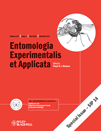
ENTOMOLOGIA EXPERIMENTALIS ET APPLICATA
Advancing insect science through innovative research.ENTOMOLOGIA EXPERIMENTALIS ET APPLICATA is a premier journal dedicated to advancing the understanding of insect science through innovative research and thorough experimental methodologies. Published by Wiley, this esteemed journal has been at the forefront of entomology since its inception in 1958, with its latest convergence extending until 2024. With a commendable Impact Factor and categorically positioned in the Q2 quartile across both Ecology, Evolution, Behavior and Systematics and Insect Science fields, it plays a pivotal role in the dissemination of critical findings. The journal is indexed in Scopus, ranking 43rd out of 181 in Insect Science, showcasing its relevance and stature within the academic community, while maintaining a robust visibility among scholars. Given its rigorous peer-review process and a commitment to quality and innovation, ENTOMOLOGIA EXPERIMENTALIS ET APPLICATA serves as a vital resource for researchers, professionals, and students aiming to deepen their insights into entomological research.

BULLETIN OF INSECTOLOGY
Fostering Collaboration for Environmental SolutionsBULLETIN OF INSECTOLOGY is a prominent academic journal published by ALMA MATER STUDIORUM, UNIV BOLOGNA, Italy, specializing in the field of Insect Science. The journal, with ISSN 1721-8861 and E-ISSN 2283-0332, has established itself as a vital resource for researchers and professionals interested in the diverse aspects of entomology and its applications. It ranks in the Q2 category for Insect Science as of 2023, placing it among the top journals in its field with a Scopus rank of 79 out of 181. The BULLETIN OF INSECTOLOGY is committed to disseminating high-quality research and innovative studies, facilitating open dialogue and collaboration among scientists. As an essential platform for sharing groundbreaking findings, it contributes significantly to the body of knowledge in agricultural and biological sciences, making it an invaluable asset for scholars and practitioners alike. With coverage from 2002 to 2024, this journal continues to foster advancements in entomological research and its importance in tackling environmental challenges.
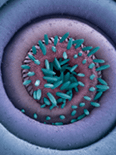
Annual Review of Entomology
Pioneering Insights in Ecology and EvolutionAnnual Review of Entomology, published by Annual Reviews, is a premier journal dedicated to advancing the understanding of entomology through comprehensive review articles from leaders in the field. With a focus on Ecology, Evolution, Behavior, and Systematics and Insect Science, the journal ranks in the top quartile (Q1) as of 2023, reflecting its significant impact and relevance in these disciplines. Based in the United States, the Annual Review of Entomology has been a trusted resource since its inception, providing critical insights that inform research, policy, and education in entomology. Researchers and professionals will find valuable reviews that synthesize current knowledge and highlight future directions in insect research. The journal's impressive standing, as indicated by its rankings—first in both Agricultural and Biological Sciences categories—emphasizes its pivotal role in shaping scientific discourse and innovation.
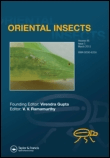
ORIENTAL INSECTS
Advancing Knowledge in Oriental Insect ScienceORIENTAL INSECTS is a distinguished journal dedicated to advancing the field of Insect Science, published by the reputable Taylor & Francis Ltd. With its long-standing history since 1967, this journal provides a platform for innovative research focused specifically on the diverse insect fauna of the Oriental region, encompassing topics such as taxonomy, ecology, physiology, and behavior. The journal is indexed with an ISSN of 0030-5316 and an E-ISSN of 2157-8745, making it easily accessible to a global audience. Although it currently does not operate under an Open Access model, its rigorous peer-review process ensures the dissemination of high-quality research. As a Q4 journal in the Insect Science category for 2023 and ranked 103 out of 181 in Scopus, ORIENTAL INSECTS remains a vital resource for researchers, professionals, and students seeking to enhance their understanding of insect biodiversity and conservation. Located in the United Kingdom, it is committed to promoting the latest scientific findings and fostering collaboration among entomologists worldwide, contributing significantly to the academic community.

APPLIED ENTOMOLOGY AND ZOOLOGY
Unlocking the complexities of insect interactions with the environment.Applied Entomology and Zoology, published by Springer Japan KK, is a pivotal journal in the field of insect science, with an impressive track record since its inception in 1966. This esteemed publication, bearing ISSN 0003-6862 and E-ISSN 1347-605X, contributes significantly to the understanding of applied entomology, emphasizing research that supports sustainable agricultural practices and the ecological conservation of insects. Ranked in the Q2 category (2023) for Insect Science with a Scopus rank of #65 out of 181, it is recognized for its rigorous peer-review process and high-quality contributions that push the boundaries of our knowledge. Although it does not currently offer open access, the journal remains an essential resource for researchers, professionals, and students eager to advance their understanding of the complex interactions between insects and their environment. With a focus on practical applications, it aims to bridge the gap between entomological research and real-world implications, fostering innovation and promoting informed decision-making within the scientific community.